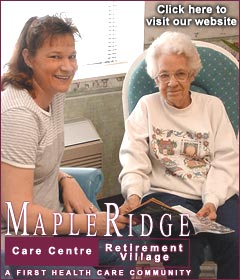|
Features,
Health Matters, Red Cross,
Calendar,
West Nile Virus,
Honors
& Awards, Announcements
Health & Fitness News Elsewhere
(fresh daily from the Web)
|
|
Features
|
|
Filter strips can control dangerous
parasite, says new research
[SEPT.
23, 2002]
URBANA — A tiny, yet potent,
one-celled protozoan is the subject of extensive research at the
University of Illinois.
|
|
And for good reason.
The protozoal parasite, Cryptosporidium
parvum (also known as Crypto), can cause acute gastrointestinal
problems in healthy people and can be fatal to anyone with a
compromised immune system.
More than 400,000 residents of
Milwaukee, three out of every four people, were stricken with
Cryptosporidiosis, the disease caused by the parasite, in 1993. In
the summer of 2001, it is believed 26 people were infected at a
water park in Peoria. In both cases, contaminated water was the
likely source of infection.
The good news is that U of I
researchers have found that vegetative filters can effectively
reduce the presence of Crypto in runoff water.
Crypto is a pathogen young livestock
shed in their waste, said Prasanta Kalita, U of I agricultural
engineer. Runoff from animal production operations can sometimes
enter a nearby water source undetected, carrying Crypto with it.

Once drinking water is contaminated,
Kalita said, treatment of the water is difficult. The dormant form
of Crypto, called an oocyst (oh’-a-sist), is very small, with a
tough outer shell, and has the ability to withstand many
environmental extremes. Crypto is also one of the most resistant
parasites to water chemical treatment.
So University of Illinois researchers
are looking for ways to control Crypto at its source — such as using
vegetative filters.
"Initially, these strips were used at
the edges of fields to buffer waterways," said Kalita, who has
worked with buffer strips for many years. "They were found to be
very beneficial in keeping sediments and chemicals like nitrogen and
phosphorous from getting into streams."
Now Kalita and his colleague Mark
Kuhlenschmidt, a veterinary pathobiology professor, are studying
them to see if they can control Crypto as well.

[to top of second column in this
article]
|

Funded by the Illinois Council on Food
and Agricultural Research, Kalita and Kuhlenschmidt have built a
tilting soil bed 12 feet long, 5 feet wide and a foot deep. Filled
with soils from Champaign and Effingham counties, the bed is divided
in half by a metal border. One half is left bare, the other planted
with brome grass.
"We spray the live Crypto at the top of
the bed," Kalita explained. "We spray the same amount on both sides,
set the bed on a certain slope and rain on it. Then we collect all
of the water that comes off the surface and the water infiltrated 1
foot below the soil surface."
The researchers have tested several
variables, including different rainfall intensities and slopes, as
well as two different soil types.
In both soil types, researches saw the
similar results — vegetation greatly reduced the amount of Crypto in
the runoff.
"But slope made a lot of difference,"
said Kalita. "We found when we had a steep, 4.5 percent slope, the
reduction was not very high, because the water went straight across
the filter."

Kalita and Kulenschmidt are also doing
tests to see if the Crypto absorbed by the soil and vegetation later
seeps down into the groundwater.
The researchers filled eight columns
with 3 feet of soil and applied high concentrations of Crypto to
each. When water was drained from the columns, no parasites were
detected in the samples.
"That is a preliminary indication that
Crypto doesn’t go through the soil. The soil acts like a barrier to
filter it out," said Kalita.
If these
results hold true, he believes vegetative filter strips, especially
in fields with tile drains, will be an excellent management practice
for the containment of Crypto coming from animal feeding operations.
[U of I news release] |
|
|
State-of-the-art technology to
provide mental health services for deaf
[SEPT.
19, 2002]
Illinois Department of Human
Services Secretary Linda Reneé Baker recently announced a
technological partnership that improves mental health services for
deaf and hard of hearing people in Illinois. The collaborative
effort involving the Illinois Department of Human Services Office of
Mental Health and mental health providers in Chicago and Springfield
will allow doctors and patients to communicate via videoconference.
|
|
"Today’s technological advances are
making it possible for the state to reach more people with expanded
and improved services," said Baker. "The telepsychiatry services for
deaf and hard of hearing persons can bring a doctor in Chicago
together with a client in central Illinois. It’s another example of
using available resources to maximize state services."
The announcement was made Sept. 9
during a "digital ribbon-cutting" at McFarland Mental Health Center
in Springfield. It marked the first time a doctor specializing in
services for deaf and hard of hearing people communicated with a
patient in another location. Joining the DHS Office of Mental Health
in the demonstration were the Illinois Masonic Medical Center’s Deaf
and Hard of Hearing Program and the Mental Health Centers of
Illinois.
"This is exciting because it marks the
first in a succession of advancements in making human services
accessible to all Illinoisans," said Baker. "Illinois is one of the
first states in the nation to provide sophisticated mental health
services for deaf and hard of hearing persons in areas where they
otherwise would not be available."
There are an estimated 214,000 deaf or
hard of hearing people in Illinois who suffer from mental illness.
DHS has worked closely with advocate groups to expand services for
this population.
[to top of second
column in this article]
|

Under the
new program, patients will receive a psychiatric evaluation and
consultation from Dorothea L. De Gutis, M.D., who has many years of
experience in providing treatment to people who are deaf or hard of
hearing. From her office in Chicago, Dr. De Gutis will use sign
language to consult with patients in central Illinois using
telepsychiatry. Telepsychiatry is the use of videoconference
technology to provide psychiatric services from a distance.
Telepsychiatry service has already proven to be successful for deaf
consumers in the metropolitan Chicago area. Although the downstate
services will initially be provided in the Springfield area, plans
are under way to duplicate those services throughout the state.
[Department of Human Services
press release] |
|
Heartland Community College
Your pathway to lifelong learning!
Community
Education Class through the Lincoln Center of HCC
For more
information or to register,
call 735-1731,
stop by HCC at 620 Broadway,
or go online at
hcc.cc.il.us/CCE |
Classes currently
available:
Intermediate MS Word
8:30-11:30 am, 9/21 & 9/28, HCC
Herbaceous Perennials
7:00-9:00 pm,
9/24, U of I
Ext.
Intro to MS Excel
6:00-9:00 pm, 9/30 & 10/7, HCC
Vachel Lindsay
7:00-9:00 pm, 10/2, 9 & 16,
Oasis |
Lincolndailynews.com
is the place to
advertise
Call (217) 732-7443
or e-mail
ads@lincolndailynews.com |
|
|
|
Health
Matters A
monthly feature from Logan County Health Department
|
|
The flu and
you
[SEPT.
3, 2002]
As the fall weather
approaches, flu season begins. Influenza is a serious and widespread
illness that is the cause of as many as 4,000 deaths each year in
Illinois. Influenza is caused by a virus that spreads from infected
people to the nose or throat of others and can cause fever, cough,
chills, sore throat, headache and muscle aches in people of any age.
Influenza should not be confused with intestinal illness.
|
|
People considered at high risk should
get a flu shot every year. The optimal time for these individuals to
receive influenza vaccine is during October and November.
High-risk categories include:
• People 65 years of age
or older.
• People with chronic
medical conditions.
• People with immune
system problems.
• Women who will be in the
second or third trimester of pregnancy during flu season.
• Children receiving
long-term aspirin therapy.
• Employees of nursing
homes or other chronic care facilities.
• Health-care workers.
• Household contacts of
people at increased risk for influenza-related complications.
[to top of
second column in this article]
|
All others should begin their flu shots
in November and later, for as long as vaccine is available.
Beginning in October, Logan County
Health Department will have flu and pneumonia immunizations
available at the Health Department, 109 Third St., and on the Rural
Health Van.
Flu shots and pneumonia shots cost $16
each. Medicare will pay for flu and pneumonia shots; clients must
bring their Medicare card with them. Medicaid will pay for only flu
shots; clients must bring their Medicaid card with them.
Watch the
newspapers for upcoming schedules of flu clinics or call Logan
County Health Department at (217) 735-2317 for more information.
[News
release]
|
|
|
Red
Cross
|
|
|
West Nile Virus
|
|
West Nile virus links
|
|
LDN articles
Federal websites
|
State websites
|
|
|
Honors
& Awards
|
|
|
Announcements
|
|
ALMH offers prenatal classes
[SEPT.
18, 2002]
The next series of prenatal
classes at Abraham Lincoln Memorial Hospital will be in October. The
series consists of four Wednesday evening classes, Oct. 2, 9, 16 and
23. Sessions are from 7 to 9 p.m.
|
|
Classes will be in conference rooms A
and B on the lower level at ALMH. The cost of the series for
expectant mothers and their significant others is $30. Participants
will receive information on topics including warning signs during
pregnancy; labor; breathing and relaxation techniques; delivery;
infant care; and breast-feeding. A tour of the ALMH Family Maternity
Suites will also be given.
For more
information or to register for the prenatal classes, call ALMH’s
Family Maternity Suites at (217) 732-2161, Ext. 235.
[News
release] |


|
|
|
Mobile
health unit schedule
The
Rural Health Partnership has announced the schedule for its mobile
health unit for 2002.
| |
Morning:
9-11 a.m. |
|
Afternoon:
1-3:30 p.m. |
|
Monday |
1st and 3rd |
Hartsburg |
1st and 3rd |
Emden |
| |
2nd and 4th |
San Jose |
2nd and 4th |
Greenview |
|
Tuesday |
Weekly |
Chestnut |
Weekly |
Mount Pulaski |
|
Wednesday |
Weekly |
New Holland |
Weekly |
Middletown |
|
Thursday |
1st and 3rd |
Elkhart |
Weekly |
Atlanta |
|
|
2nd and 4th |
Friendship
Manor-Lincoln |
|
|
|
Friday |
1st, 2nd,
4th |
Village Hall-Latham |
1st |
Beason |
| |
|
|
2nd and 4th |
Broadwell |
| |
3rd |
Maintenance/ special
events |
3rd |
Maintenance/
special events
|
The
mobile health unit does not operate on the following dates for
holidays
during 2002: Jan. 21 (Martin Luther King Jr. Day), Feb. 18 (Presidents’ Day),
March 29 (Good
Friday), May 27 (Memorial Day), July 4 (Independence Day), Sept. 2 (Labor Day), Oct.
14 (Columbus Day), Nov. 11 (Veterans Day), Nov. 28-29
(Thanksgiving break) and Dec. 24-25 (Christmas break).
For more
information on the mobile health unit schedule and services, contact
Dayle Eldredge at (217) 732-2161, Ext. 409.
|
|
|
Community
resource list
This
family resource list to save and use is provided by the Healthy
Communities Partnership and the Healthy
Families Task Force, 732-2161, Ext. 409.
|
Agency |
Phone number |
Address |
|
Lincoln
agencies |
|
911 |
911 (emergency)
732-3911 (office -- non-emergency)
|
911 Pekin St.
Lincoln, IL 62656
|
|
Abraham Lincoln
Memorial Hospital
|
732-2161
|
315 Eighth St.
Lincoln, IL 62656
|
|
American Red Cross
www.il-redcross.org |
732-2134 or
1 (800) 412-0100
|
125 S. Kickapoo
Lincoln, IL 62656
|
|
Catholic Social
Services
www.cdop.org |
732-3771 |
310 S. Logan
Lincoln, IL 62656
|
|
Lincoln/Logan County Chamber
of Commerce
www.lincolnillinois.com |
735-2385 |
303 S. Kickapoo St.
Lincoln, IL 62656
|
|
Community Action (CIEDC) |
732-2159
|
1800 Fifth St.
Lincoln, IL 62656
|
|
Crisis Pregnancy Center/
Living Alternatives |
735-4838 |
408 A Pulaski St.
Lincoln, IL 62656
|
|
DCFS (Department of
Children
& Family Services) |
735-4402 or
1 (800) 252-2873
(crisis hotline)
|
1120 Keokuk St.
Lincoln, IL 62656
|
|
Heartland Community
College
- GED program |
735-1731 |
620 Broadway St.
Lincoln, IL 62656
|
|
Housing Authority |
732-7776
|
1028 N. College St.
Lincoln, IL 62656
|
|
Illinois Breast &
Cervical Cancer Program (IBCCP)
www.logancountyhealth.org |
735-2317 or
1 (800) 269-4019
|
109 Third St.
Lincoln, IL 62656
|
|
Illinois Employment and Training Center (replaces JTPA office) |
735-5441 |
120
S. McLean St., Suite B
Farm
Bureau Building
Lincoln,
IL 62656
|
|
Lincoln Area YMCA
|
735-3915 |
319 W. Kickapoo St.
Lincoln, IL 62656
|
|
Lincoln/Logan Food
Pantry |
732-2204
|
P.O. Box 773
Lincoln, IL 62656
|
|
Lincoln Parents’
Center |
735-4192 |
100 S. Maple
Lincoln, IL 62656
|
|
Lincoln Park District |
732-8770 |
1400 Primm Rd.
Lincoln, IL 62656
|
|
Logan County Department
of Human Services (Public Aid)
www.state.il.us/agency/dhs |
735-2306 |
1500 Fourth St.
P.O.
Box 310
Lincoln, IL 62656
|
|
Logan County Health
Department
www.logancountyhealth.org |
735-2317 |
109 Third St.
P.O. Box
508
Lincoln, IL 62656
|
|
Logan-Mason Mental
Health |
735-2272 or
735-3600
(crisis line)
|
304 Eighth St.
Lincoln, IL 62656
|
|
Logan-Mason
Rehabilitation Center |
735-1413 |
760 S. Postville Drive
Lincoln, IL 62656
|
|
The Oasis
(Senior Citizens
of Logan County) |
732-6132 |
501 Pulaski St.
Lincoln, IL 62656
|
|
Project READ
|
735-1731 |
620 Broadway St.
Lincoln, IL 62656
|
|
Salvation Army |
732-7890
|
1501 N. Kickapoo
Lincoln, IL 62656
|
|
Senior Services of
Central Illinois |
732-6213 or
1 (800) 252-8966
(crisis line)
|
109 Third St.
Lincoln, IL 62656
|
|
U. of I. Extension
Service
www.ag.uiuc.edu |
732-8289 |
980 N. Postville Drive
Lincoln, IL 62656
|
|
Springfield
agencies |
|
Department of Aging
www.state.il.us/aging |
785-3356 |
421 E. Capitol, #100
Springfield, IL 62701-1789
|
|
American Cancer Society
www.cancer.org |
546-7586
(24 hour) |
1305 Wabash, Suite J
Springfield, IL 62704
|
|
Community Child Care
Connection
www.childcaresolutions.org |
(217) 525-2805 or
1 (800) 676-2805
|
1004 N. Milton Ave.
Springfield, IL 62702-4430
|
|
Hospice Care of
Illinois |
1 (800) 342-4862
(24 hour) or
732-2161, Ext. 444
|
720 N. Bond
Springfield, IL 62702
|
|
Illinois Department of
Public Health
www.idph.state.il.us |
(217) 782-4977
|
535 W. Jefferson
Springfield, IL 62761
|
|
Legal Assistance
Foundation |
(217) 753-3300 or
1 (800) 252-8629
|
730 E. Vine St., Suite
214
Springfield, IL 62703
|
|
Sojourn Shelter &
Services Inc.
http://www.sojournshelter.org/
|
732-8988 or
1 (866) HELP4DV
(24-hour hotline)
|
1800 Westchester Blvd.
Springfield, IL 62704
|
|
U. of I. Division of
Specialized Care for Children
www.uic.edu |
524-2000 or
1 (800) 946-8468
|
421 South Grand Ave.
West
Second Floor
Springfield, IL 62704
|
|
Logan County
libraries |
|
Atlanta Library |
(217) 648-2112 |
100 Race St.
Atlanta, IL 61723 |
|
Elkhart Library |
(217) 947-2313 |
121 E. Bohan
Elkhart, IL 62634 |
|
Lincoln Public Library
www.lincolnpubliclibrary.org |
732-8878 |
725 Pekin St.
Lincoln, IL 62656 |
|
Mount Pulaski Library |
792-5919
|
320 N. Washington
Mount Pulaski, IL 62548
|
|
|
(updated
2-15-02) |
|
Back
to top |
News
| Sports
| Business
| Rural
Review |
Teaching
& Learning |
Home
and Family |
Tourism
| Obituaries
Community |
Perspectives |
Law
& Courts |
Leisure Time |
Spiritual
Life | Health
& Fitness |
Calendar
Letters
to the Editor
|
|

